
Asbury Park Dinner Table volunteers distribute meals at United Fellowship Church in Asbury Park. Photo by James J. Connolly
On Monday, March 9, of last year, when Governor Murphy declared a state of emergency to contain the spread of Covid-19, Kathy Kelly closed her Asbury Park shop, Paranormal Books and Curiosities. She hoped she would be able to reopen sometime that weekend.
“When we look back on it now,” she admits, “wow, were we really naïve.”
But when Murphy, on March 16, restricted restaurants to takeout only, Kelly correctly foresaw that Asbury Park’s bustling downtown restaurant scene “was going to go downhill really, really fast.”
Kelly, who had worked in restaurants during and after college, reached out to fellow Asbury Park locals Julie Andreola and Joe Grillo, who have experience in the nonprofit sector. Together, they launched a program called Asbury Park Dinner Table (APDT) to provide meals to people in need while keeping crucially sustaining cash flowing to struggling restaurants.
Money donated to APDT is used to purchase meals from local partner restaurants, including Cardinal Provisions, Reyla, Sami’s Mediterranean Street Food and Langosta Lounge. The restaurants prepare and package the meals to go. Volunteers distribute the meals at designated Asbury Park locations, including churches, senior centers and public housing.
“It’s a very simple mechanism,” says Kelly. “What comes in goes out, and it’s 100 percent volunteer driven.” A $10 donation funds two meals.
“There are organizations that deal with much larger funding that are in a better position to deal with things long-term,” says Kelly, referring to soup kitchens and food banks like Fufill NJ and the Community FoodBank of New Jersey. “But you need something small and agile to deal with today. We’re the triage unit. We’ll stitch you up; we’ll stop the bleeding. You need somebody who’s going to do that.”
By March 19, the APDT team had distributed its first 90 meals, many to newly laid-off members of the hospitality industry. “Some of the people who were most at risk were those that had never experienced food insecurity in their lives before,” says Kelly.
To date, the organization has provided more than 100,000 meals, distributing up to 500 a day at the pandemic’s peak last spring—a life raft for local restaurants, which have been weighed down by restrictions on hours and seating capacity for the last 12 months.
Sam Chung, cofounder of MOGO Korean Fusion Tacos, has partnered with APDT since its inception. At first, MOGO prepared variations of their flavor-packed Korean-fusion meals. But meals have evolved with changing needs and now always include a protein, starch and vegetable.
“We’ve worked really hard to keep our team together throughout the crisis,” he says. “And one of the reasons we were able to do it was because of the Dinner Table, which provided enough purpose to keep going, especially in April.”
Without APDT, says Chung, MOGO “would have shut down and had to lay off all our employees.”

Clockwise from left, Sam Chung, cofounder of MOGO Korean Fusion Tacos, was among the first to partner with Asbury Park Dinner Table; Jackie Manso packs meals to be distributed; and Corey Shields prepares chicken alfredo. Photos by James J. Connolly
Around the time Kelly was reaching out to restaurants to launch APDT, Audible, the audiobook and podcast company headquartered in Newark, was developing its own Covid-19 response. Before the pandemic, Audible had hosted a weekly “Lunch Out Wednesday” program, subsidizing hundreds of its employees to eat at Newark restaurants.
To help Newark eateries, Audible consulted with chef Marcus Samuelsson, whose restaurant Marcus B&P is located in downtown Newark, and with World Central Kitchen, founded by chef José Andrés, who was nominated for a 2019 Nobel Peace Prize for his work in addressing hunger and food insecurity.
Those outreaches evolved into the creation of Newark Working Kitchens (NWK), which received donations from PSEG, Panasonic, TD Bank and the New Jersey Devils to sustain local restaurants while providing meals for low-income seniors and individuals, as well as families without homes.
Audible has continued to raise funds to sustain the program and helped preserve over 200 jobs for restaurant cooks, servers and delivery staff, many of whom live in Newark, one of the cities hit hardest by Covid-19. In late October, Newark reinstituted an 8 pm business curfew after a surge in cases, when the city’s test-positivity rate reached 11 percent. The restriction limited restaurants even further at a time when restaurants in other parts of the state were allowed to remain open until 10 pm.
From each participating restaurant, NWK orders roughly 500 meals a week and partners with a range of organizations to help distribute them. The volunteer-driven program works with local nonprofits and remains in close contact with Mayor Ras Baraka’s office to ensure the meals get to the most vulnerable members of the community. To facilitate those deliveries, Audible has made available its employee shuttles, which were idled when most employees began working from home in the pandemic.
As of late January, NWK has provided more than 700,000 meals, many delivered to Covid-positive individuals unable to leave their homes, as well as to people residing in city shelters.
“So many of us have poured in [to help] the city’s revitalization,” says Aisha Glover, vice president of urban innovation at Audible. “We want to make sure the businesses remain.”
NWK has helped keep lights on, doors open and Newark residents employed at more than two dozen restaurants. One of those is Uncle Willie’s Wings, whose owner, Walter Green, almost lost his restaurant after his own Covid-19 diagnosis. Another is Pita Square, which had been open less than a year and was still establishing itself when the pandemic struck. Ali Darweesh, who opened King’s #1 Family Restaurant in Newark’s South Ward in 1990, is happy to remain open, sharing his Southern-style food with others.
At a recent town hall that Audible hosted for its 24 partner restaurants, one restaurant owner declared that NWK “has been a lifeline” for all of them. “It’s heartwarming and heartbreaking to hear that,” says Glover. “It really furthers our sense of urgency.”
In January, the New Jersey Economic Development Authority (NJEDA) announced a $2 million grant program called Sustain and Serve NJ that will provide funding to nonprofits to purchase meals from restaurants and distribute them at no cost to Jersey residents in need.
It’s a model that Asbury Park Dinner Table and Newark Working Kitchens have shown can work—and one that APDT cofounder Kelly hopes will continue for as long as there’s a need. “It benefits everybody,” she says. “A high tide raises all boats.”
To make a donation to the organizations, visit their websites. For Asbury Park Dinner Table, go to asburyparkdinnertable.org; for Newark Working Kitchens, visit newarkworkingkitchens.com.



